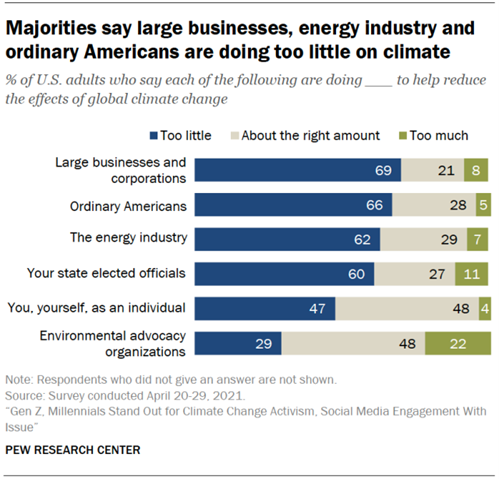In a 2021 Pew Research study, the survey found that Gen Zers and Millennials talk more about the need for action on climate change than older adults. While many forms of political engagement, such as voting, tend to be higher among older adults, 32% of Gen Zers and 28% of Millennials have taken at least one of four actions including donating money, contacting an elected official, volunteering, or attending a rally to help address climate change in the last year. This compares to smaller shares of Gen X (23%) and Baby Boomer and older adults (21%).
When asked about engaging with climate change content online, the survey revealed that Gen Z are particularly likely to express anxiety about the future. Among social media users, nearly 7 in 10 Gen Zers (69%) say they felt anxious about the future when they saw content about addressing climate change. A smaller majority (59%) of Millennial social media users report feeling this way when they see climate change content, while fewer than half of Gen X (46%) and Baby Boomer and older (41%) social media users say the same.
The Pew study found that the majority think that large businesses, the energy industry, and ordinary Americans are doing too little to reduce the effects of global climate change. Perhaps this, combined with Gen Zers and Millennials taking more action on climate change, is why colleges and universities are integrating sustainability into their curriculum. In a previous post, The Role of Education in Addressing Climate Change, we discussed that there is a strong and increasing trend toward incorporating climate change education into degree programs. Many universities and colleges recognize not only the urgency of addressing climate change, but also how important the issue is to their students, and are taking proactive steps to make sure their students are equipped with the knowledge and skills necessary to navigate a climate-impacted world.
For example, the University of California San Diego (UCSD) implemented an innovative graduation requirement for all students starting in the fall of 2024, a course in climate change. Arizona State University (ASU) has implemented a sustainability requirement for all undergraduate students graduating after the spring 2025 semester. This requirement includes a focus on climate change and environmental issues, aiming to equip students with the knowledge and skills to address these critical challenges.

The Green Economy
Key characteristics of the green economy include low carbon emissions, resource efficiency, and social inclusion. It is a growing and evolving field with significant potential for job creation and economic growth. It encompasses a wide range of sectors that aim to reduce environmental impact while promoting economic growth. Sectors include:
- Renewable energy: Renewable energy is energy derived from natural sources that are replenished at a faster rate than they are consumed. This includes solar, wind, hydro, geothermal power, and bioenergy.
- Eco-tourism: Sustainable travel that minimizes environmental impact and benefits local communities.
- Waste management: This includes recycling, composting, waste reduction, and resource recovery.
- Sustainable agriculture: Sustainable agriculture is farming that meets the needs of the present without compromising the ability of future generations to meet their own needs. This includes organic farming, permaculture, and agroecology.
- Green construction: Green construction, also known as sustainable or eco-friendly building, is the practice of creating structures that are environmentally responsible and resource-efficient throughout their entire lifecycle.
Sustainable Career Paths
The sustainable career paths for young people interested in sustainability span a wide range, offering opportunities in fields like environmental science, renewable energy, sustainable agriculture, and sustainable design and architecture. For example, environmental science roles include environmental scientists who study environmental issues and develop solutions, wildlife biologists who study wildlife populations and habitats, hydrologists who study water resources, and meteorologists who study weather patterns and climate change.
Renewable energy careers include solar panel installers, wind turbine technicians, geothermal technicians, and energy auditors who conduct energy audits of buildings. In addition, there are career opportunities in sustainable agriculture, sustainable design, and architecture. Finally, other sustainable career paths include environmental lawyers who advocate for environmental protection, environmental educators who raise awareness about environmental issues, and sustainability consultants who guide businesses and organizations toward sustainability.
Skills and Education Needed to Enter Sustainability Fields
To have a successful career in sustainability, critical thinking and problem-solving abilities are required to analyze complex environmental and social challenges, along with the ability to develop innovative solutions. Additional skills such as strong communication and collaboration are essential for effectively conveying information to diverse audiences, such as scientists, policymakers, and the public, and for working effectively in teams. Sustainability careers require data analysis and interpretation skills crucial for understanding and working with data related to environmental impacts, resource utilization, and social equity. In order to execute sustainability initiatives efficiently and effectively, project management skills are also necessary for planning, organizing, and execution.
In addition, formal education plays a significant role with degrees providing a strong foundation. Pursuing certifications like Leadership in Energy and Environmental Design (LEED) or Project Management Professional (PMP), or obtaining certifications related to specific renewable energy technologies can also enhance career prospects. Informal education is equally valuable as internships offer practical experience in sustainability roles within companies, nonprofits, or government agencies. Volunteer work with environmental organizations or community projects provides valuable skills and networking opportunities.
Conclusion and Recommendations
The growing awareness of climate change among younger generations, together with their increased engagement in climate action, are creating demand for education and career paths that address these critical issues. As colleges and universities integrate sustainability into their curricula, they are empowering students with the knowledge and skills necessary to navigate a changing world. Younger people interested in jobs in the green economy will find a diverse range of career opportunities across sectors like renewable energy, eco-tourism, and sustainable agriculture.
Success in sustainability careers requires a unique combination of skills such as critical thinking, problem-solving, communication, collaboration, data analysis, and project management. Formal education, certifications, and practical experience through internships and volunteer work are all important steps for building a successful career in sustainability. Nurturing a deeper understanding of environmental issues, and equipping students with the necessary tools and knowledge will cultivate a new generation of leaders who are prepared to address the challenges of climate change and build a more sustainable future.


